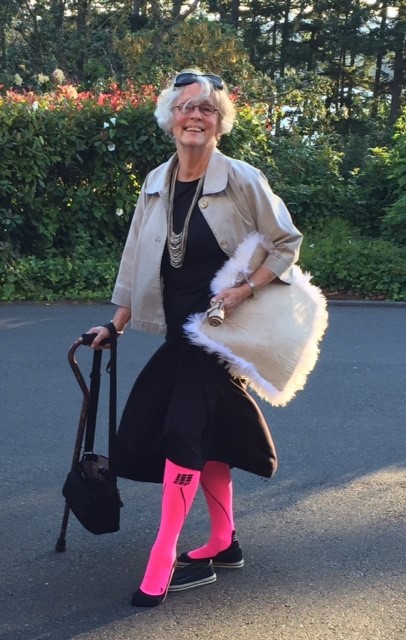For Annie Graham, a volunteer patient with the Island Medical Program (IMP), the clinical skills session was supposed to be a predictable but gratifying way of helping UBC medical students learn how to interview and examine patients.
Graham, 72, had been volunteering as a patient for ten years, ever since she moved to Vancouver Island. The session in October was focused on the musculoskeletal system, and required patients to walk on their heels and toes.
But Graham struggled with that task. The physician overseeing the session, Sam Stewart, quickly noticed.
“Only Sam picked up that I couldn’t walk on my heels during the test,” Graham said. “He said there might be something wrong with the L4 and L5 spinal columns in my back, and that I should get further testing.”
On Dr. Stewart’s suggestion, Graham visited a physical therapist, which led to an X-Ray and CT scan. But they showed nothing. In early March, a neurologist did an electromyography exam, measuring the electrical activity in her body’s tissue. On April 26, she received a diagnosis from the neurologist: amyotrophic lateral sclerosis (ALS).
Also known as Lou Gehrig’s disease, ALS attacks cells in the brain and spinal cord needed to keep the body’s muscles moving, even while the brain remains untouched. There is no cure, and life expectancy after diagnosis is between two and five years.
“The bottom fell out of the room,” she recalls. “I felt awful. I shut down. My husband tried to keep composure, asking our doctor questions. I didn’t know what to do.”
She has since found her bearings: With friends, she aims to be one of the top local fund-raisers for the Walk for ALS, which takes place this weekend in Victoria, and in many communities across Canada from June to October.
So far, her team is succeeding. As of this writing, they’ve raised an astounding $18,375 – nearly half of the $42,302 so far raised for the Victoria region.
Some days are dark days, she admits. And some chores, like washing dishes, are becoming more difficult. Recently she got a new electric scooter, which helps with the fatigue that afflicts ALS patients. But still, each day she notices the disease progressing.
Amid the challenges, Annie remains strong – largely due, she explains, to her friends and the overwhelming support they’ve shown her. That includes her friends from the Island Medical Program.
“It’s like a second family when you walk in the door,” she says of the IMP staff and volunteer patients. “Everyone knows everyone else. And I really enjoy it.”
Most of the volunteer patients in the Island Medical Program’s clinical sessions are healthy. Occasionally, however, the sessions lead to serious discoveries.
Graham plans on attending clinical skills sessions as long as she’s able. For Karen Basi, the Patient Program Coordinator for the Island Medical Program, this is thrilling news.
“Annie has been a dedicated patient since 2006. And we love having her – she’s friendly, outgoing, and seems always to put the students at ease.”
Malcolm Howard, a third-year student who worked with Graham since his first year in medical school, feels the same: “She’s an awesome volunteer who always smiles and laughs. I really appreciate her dedication, that she cares so much about the program.”
“In the end, I want to know that I’ve made a difference for the students,” Graham says. “I want them to learn the skills they did with me.”
For those who’d like to support Annie and to help raise money and awareness for ALS, consider donating to her campaign and joining the walk on September 18 at the University of Victoria, Parking Lot 10. For more information about the walk, click here.
